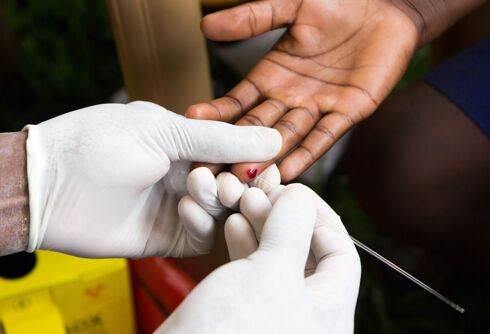Alabama Gov. Kay Ivey (R) signed a bill on Wednesday shielding in-vitro fertilization (IVF) providers from civil and criminal liability a little over two weeks after the state’s Supreme Court ruled that embryos have the same legal rights as children.
The court’s February 16 decision created widespread fear that IVF providers could face criminal charges if they mishandle or destroy an embryo. Discarding unused or abandoned embryos is a routine part of the IVF process, and the court even acknowledged that its ruling would effectively end IVF treatment in Alabama. Several major providers in the state halted IVF treatment in recent weeks, leaving LGBTQ+ couples, single people, and those who struggle with fertility issues with dwindling access to the most common method of assisted reproduction.
Related:
Court rules embryos are legally children & IVF advocates are terrified of the consequences
IVF has been effectively banned in Alabama as doctors could now be charged with murder if they mishandle an embryo.
The ruling left Alabama lawmakers scrambling for a fix, and on Tuesday, both the state House and Senate approved S.B. 159 by overwhelming majorities. Ivey signed the bill on Wednesday.
Stay connected to your community
Connect with the issues and events that impact your community at home and beyond by subscribing to our newsletter.
“The overwhelming support of SB 159 from the Alabama Legislature proves what we have been saying: Alabama works to foster a culture of life, and that certainly includes IVF,” she said in a press release. “I am pleased to sign this important, short-term measure into law so that couples in Alabama hoping and praying to be parents can grow their families through IVF.”
S.B. 159 shields IVF doctors and clinics from criminal and civil liability “for the damage to or death of an embryo.” It also limits the liability of companies that ship embryos to damages covering “the price paid for the impacted in vitro cycle,” according to the New York Times.
The bill, however, does not address the fundamental issue of whether frozen embryos should be considered children under Alabama law.
Democratic lawmakers said the bill does not go far enough in addressing the state Supreme Court’s ruling.
“We aren’t providing a solution here,” said Rep. Chris England (D). “We’re creating more problems. We have to confront the elephant in the room.”
House Minority Leader Anthony Daniels (D) said that until lawmakers address whether embryos outside the womb are considered children, S.B. 159 amounts to “just putting a Band-Aid over something that requires stitches and surgery.”
“The question that’s answered by this bill is, are our fertility clinics liable?” Clare Ryan, a professor of family law at the University of Alabama, told the New York Times. “It doesn’t address these bigger questions about, what is the child? When does the act of conception occur? What is the role of uterine implantation?”
University of Alabama law professor Susan Pace Hamill put the situation in even more damning terms: “Republicans created this mess for themselves, and now they’re trying to contain the damage from it without dealing with the mess itself,” she told the Times. “They are doing back somersaults to avoid disturbing directly anything the Alabama Supreme Court said.”
State Republicans acknowledged that the purpose of S.B. 159 was to allow clinics to resume providing IVF treatment.
“This is our best solution to help the families that are in the middle of that process continue that process,” state Rep. Terri Collins (R), the bill’s House sponsor, said.
In her Wednesday statement, Ivey, who signed a near-total ban on abortion in the state in 2019, said she anticipated “more work to come” on the issue of IVF.
Daniels has put forward a bill stating that fertilized eggs and human embryos that exist outside of a human body cannot be considered persons under Alabama law, as well as an amendment to the state’s constitution stating the same. The state’s legislature, in which Republicans hold a supermajority, has not considered either measure, according to the AL.com and the New York Times.
“There’s a lot of conversation going on right now while we address this,” Alabama House Speaker Nathaniel Ledbetter (R) told AL.com. “We certainly need to continue those conversations and probably will see moves to come down the road, put a committee together to try to figure that out with professionals and with members as well.”
Meanwhile, several Alabama providers that paused IVF treatment said they would resume services.
Hannah Echols, a spokesperson for the University of Alabama at Birmingham Health System, said that UAB would restart IVF treatments. “While UAB is moving to promptly resume IVF treatments, we will continue to assess developments and advocate for protections for IVF patients and providers,” Echols said in a statement.
“As currently drafted, this gets us back to taking care of our patients,” said Dr. Janet Bouknight of Alabama Fertility.
Others sounded a more cautious note.
“While we are grateful for the actions of Alabama legislators, this legislation does not address the underlying issue of the status of embryos as part of the IVF process – threatening the long-term standard of care for IVF patients,” Barbara Collura, president and CEO of RESOLVE: The National Infertility Association, said in a statement. “There is more work to be done.”
Infirmary Health Systems, which includes the Center for Reproductive Medicine at Mobile Infirmary, the clinic at the center of the lawsuit that led to the Alabama Supreme Court’s decision, said it would not resume IVF treatment, according to the New York Times.
“At this time, we believe the law falls short of addressing the fertilized eggs currently stored across the state and leaves challenges for physicians and fertility clinics trying to help deserving families have children of their own,” Infirmary Health said in a statement.
People in the Alabama House gallery applauded S.B. 159’s passage on Tuesday. But at least one Alabama Fertility patient told NBC News that she still plans to move her embryos out of the state. Meghan Cole described the bill as a short-term win. But, she said, “I don’t trust what the state’s going to do and don’t want to have to either keep my embryos in storage in perpetuity or not be allowed to discard them.”
Don't forget to share:
















